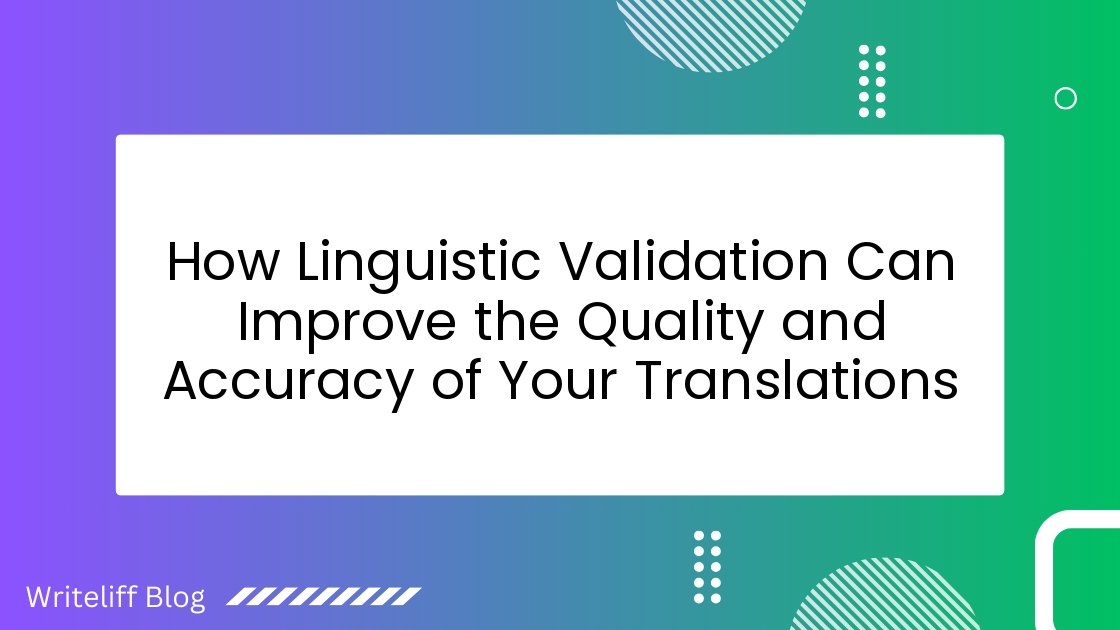How Linguistic Validation Can Improve the Quality and Accuracy of Your Translations

When it comes to expanding your business globally, a professional translation service is essential for ensuring that your message is accurately conveyed to your target audience. However, translation alone may not be enough to guarantee the quality and accuracy of your content. This is where linguistic validation comes into play. In this blog post, we’ll explore how linguistic validation can improve the quality and accuracy of your translations, making your content more effective and engaging for your international audience.
Understanding Linguistic Validation
Linguistic validation is a process that goes beyond simple translation. It involves a thorough review of the translated content by native speakers who are experts in the subject matter. This ensures that the content is not only accurately translated but also culturally appropriate and easy to understand for the target audience. Some key aspects of linguistic validation include:
- Conceptual equivalence: Ensuring that the translated content conveys the same meaning as the original text.
- Cultural adaptation: Adapting the content to suit the cultural context of the target audience, including idiomatic expressions, humor, and references to local customs.
- Readability: Ensuring that the translated content is easy to read and understand for the target audience.
Benefits of Linguistic Validation
By incorporating linguistic validation into your translation process, you can enjoy several benefits that will ultimately improve the quality and accuracy of your translations:
Enhanced Cultural Relevance
One of the main advantages of linguistic validation is that it ensures your content is culturally relevant and appropriate for your target audience. This is particularly important when dealing with marketing materials, as cultural nuances can significantly impact the effectiveness of your message. By working with native speakers who understand the cultural context, you can avoid potential misunderstandings and ensure that your content resonates with your audience.
Improved Readability and Comprehension
Linguistic validation also helps improve the readability and comprehension of your translated content. Native speakers can identify and correct any awkward phrasing or unclear language, ensuring that your message is easy to understand for your target audience. This can lead to better engagement and a more positive user experience.
Reduced Risk of Errors
By involving native speakers in the validation process, you can significantly reduce the risk of errors in your translated content. This includes not only grammatical and spelling errors but also issues related to cultural sensitivity and appropriateness. By minimizing errors, you can maintain a professional image and protect your brand reputation.
Implementing Linguistic Validation in Your Translation Process
To incorporate linguistic validation into your translation process, consider the following steps:
- Choose the right professional translation service: Look for a translation service that offers linguistic validation as part of their package, ensuring that your content is reviewed by native speakers with expertise in your industry.
- Provide clear guidelines: Communicate your expectations and requirements to the translation service, including any specific cultural considerations or preferences.
- Review and provide feedback: Once the translated content has been validated, review it carefully and provide feedback to the translation service. This will help them refine their process and improve the quality of future translations.
Conclusion
Incorporating linguistic validation into your translation process is a crucial step in ensuring the quality and accuracy of your content. By working with a professional translation service that offers linguistic validation, you can create culturally relevant, easy-to-understand content that resonates with your international audience. This will ultimately lead to better engagement, improved brand reputation, and greater success in your global expansion efforts.
